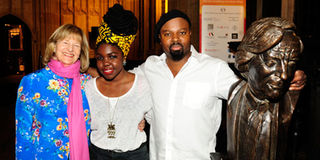Is the Caine Prize an award or an imperialist tool?

From left to right: Baroness Nicholson of Winterbourne, President of the Council, Winner Okwiri Oduor and Ben Okri OBE, Vice President. The Caine Prize has been a launching pad for many Kenyan and African authors’ international writing careers. PHOTO | FILE
What you need to know:
- It is an irony that Binyavanga Wainaina fleshed out in his satirical guide, How to write about Africa that appeared in Granta 92 magazine in 2005. In its justified cynicism,
- Zimbabwe’s NoViolet Bulawayo’s Hitting Budapest won the 2011 edition and follows the same thought line. Biting poverty depicted through children characters in Africa is so demeaning and a good sell in the West.
Lidudumalingani Mqombothi, a South African street photographer, has been declared the winner of the 17th edition of the Caine Prize for African Writing for his story Memories We Lost. The Caine Prize has been a launching pad for many Kenyan and African authors’ international writing careers. They include Binyavanga Wainaina, Yvonne Owuor and Okwiri Oduor.
Imperialism is a policy of extending a nation’s authority by territorial gain or by the establishment of economic, political and social dominance over other nations. With themes like mental illness, death, religious manipulations, unrealised dreams by the Africans in the West, genocide, colonialism and post-colonialism, the Caine award reeks of imperialism.
It is also a dichotomy between Africa and its former colonial masters that is premised on the discourse that the African is crude — a condition that could be improved through contact with European civilisation. The African writer has, therefore, to bring out the worst from Africa to impress the judges, yet Africa has rich and enhancing stories.
It is an irony that Binyavanga Wainaina fleshed out in his satirical guide, How to write about Africa that appeared in Granta 92 magazine in 2005. In its justified cynicism, Wainaina says: “Never have a picture of a well-adjusted African on the cover of your book, or in it, unless that African has won the Nobel Prize. An AK-47, prominent ribs, naked breasts: use these. If you must include an African, make sure you get one in Masai or Zulu or Dogon dress.”
MEASURED DELICACY
Lidudumalingani’s Memories We Lost has a contemporary theme of mental health. It is a charming, superimposed and emotively narrated short story of a girl who protects her mentally ill sister, a condition that causes consternation in a South African village.
By conjuring powerful and awe-inspiring images, Lidudumalingani created a sympathetic and emotional tone that enkindles a sad mood in the reader when one considers the woeful plight of its protagonist. The author also infused themes of love between two siblings, a recollection of childhood memories just like Simbi’s in Okwiri Oduor’s My Father’s Head and a community’s love for their environment. These themes encapsulate the major theme of mental illness and its stigmatisation. But even then, the story is still an elongation of imperialism.
The protagonist’s sister suffers from schizophrenia, which is referred to as the “thing”. When under seizure, Nkunzi the sangoma (traditional healer) “bakes” the mentally ill in a visual representation of the erstwhile traditional African beliefs that verge on the occult: a very intense fire is made from cow dung and wood, and then the mentally sick person is placed on a zinc roof and receives severe burns to exorcise the demons.
The inhumane killing of a goat to appease the ancestors is uncouth, ferocious, untamed and barbaric: “Knives were drawn, and the goat was first stabbed in the stomach to summon our ancestors from their enclaves, and then it was meat.”
Using her creative genius, Okwiri Oduor bequeathed us My Father’s Head, a story that justifies my line of reasoning. The story explores Simbi the narrator’s difficulty in dealing with the loss of her father when a tractor overruns him and whose prolonged mourning, a recollection of painful and repressed memory, loneliness and death are too melancholic in tone. Though this tale also addresses other socio-cultural issues like religious zeal, relationships, care for the elderly and a generous sprinkling of Africa’s beliefs, thematically it still comes out as a requiem.
PROMISE OF PROSPERITY
The reporting of death by the narrator is like a man watching Escape from Sobibor: “...with a measured delicacy: how his legs were strewn across the road, sticky and shiny with fresh tar, and how one foot remained inside his tyre sandal, pounding the pedal of his bicycle, and how cane juice filled his mouth and soaked the collar of his polyester shirt”.
Nigerian Tope Folarin won the award in 2013 with his story, Miracle. The story depicts the prevailing belief in Christian supernaturalism, and the apparent promise of prosperity it holds for the African adherent as the means of achieving success in the Diaspora to “forget the harsh rigidity of their lives back home.”
Zimbabwe’s NoViolet Bulawayo’s Hitting Budapest won the 2011 edition and follows the same thought line. Biting poverty depicted through children characters in Africa is so demeaning and a good sell in the West: “Godknow’s shorts, torn at the back and his pitch-black buttocks peeping like strange eyes through the dirty white fabric.” Chipo, another child character’s destiny has been ruined when her grandfather impregnates her.
Africa has continued to play a reactive and peripheral role in literary, socio-political and economic dominance globally. And as long as this anomaly continues, the African writer’s relationship with the former colonial masters will remain evocative of the long betrothal between god Zeus and goddess Hera.




